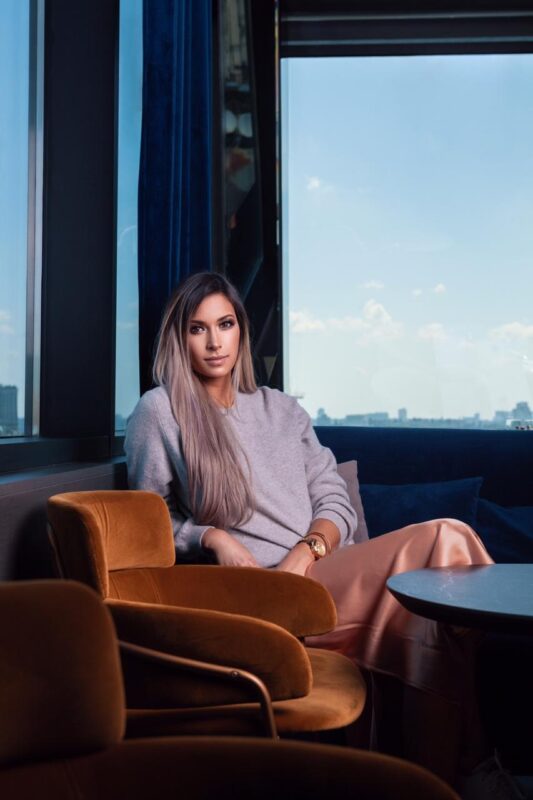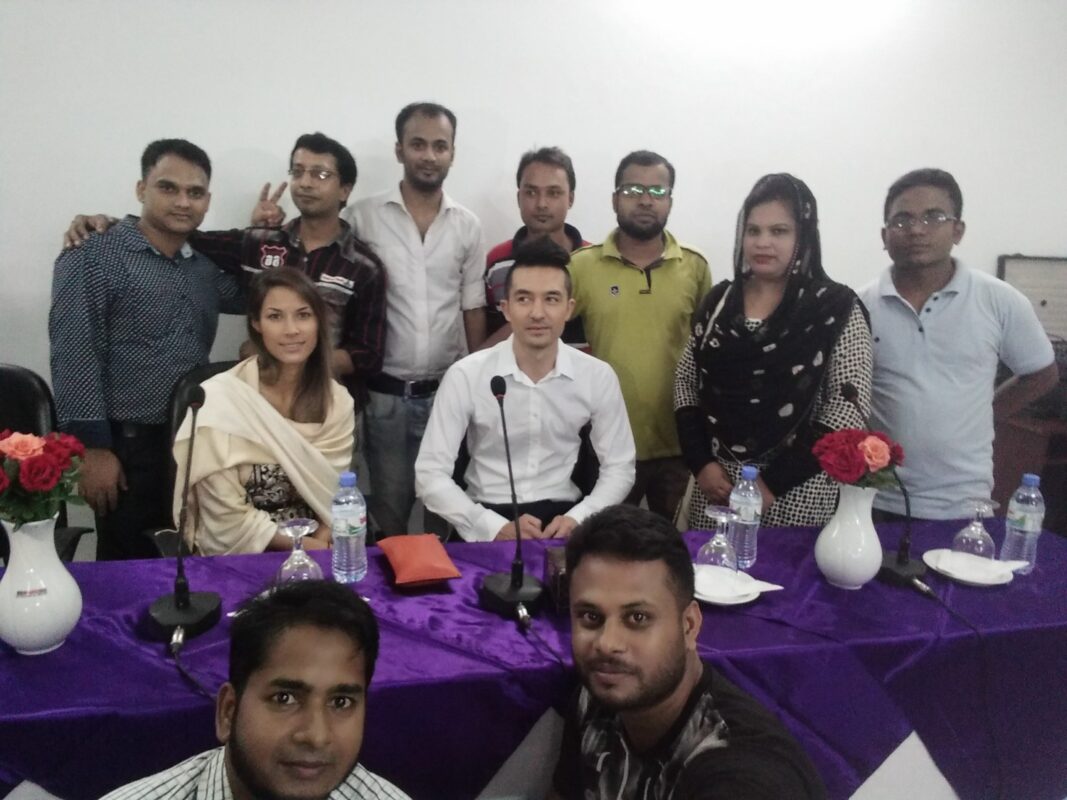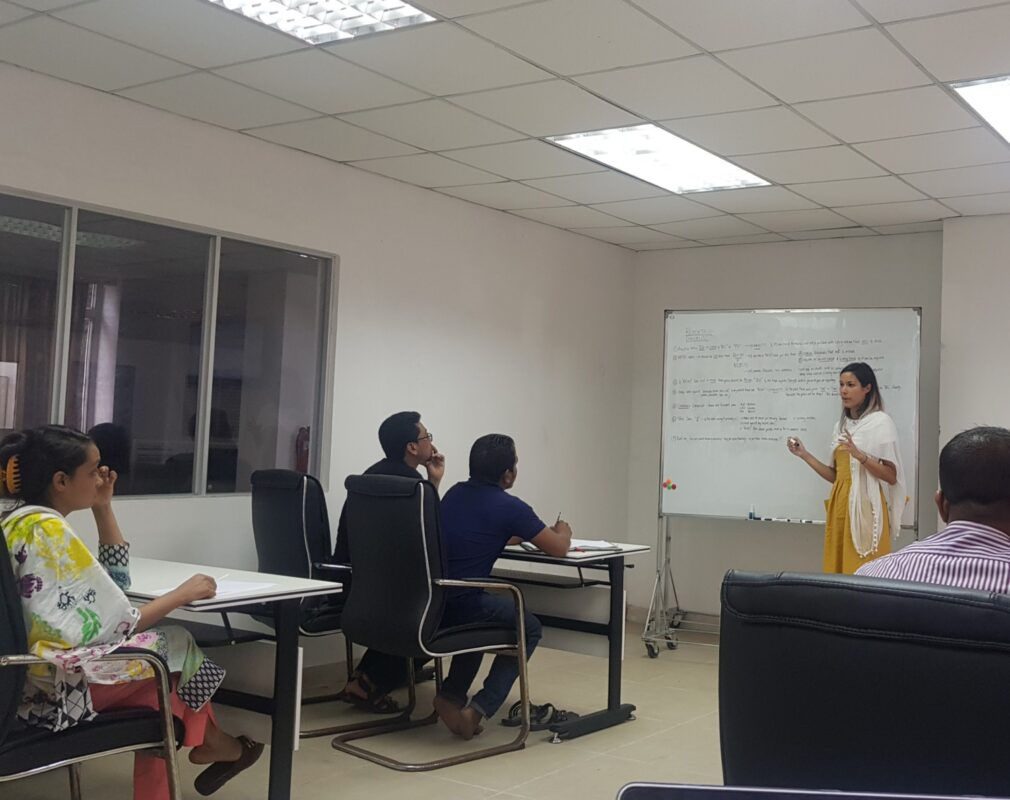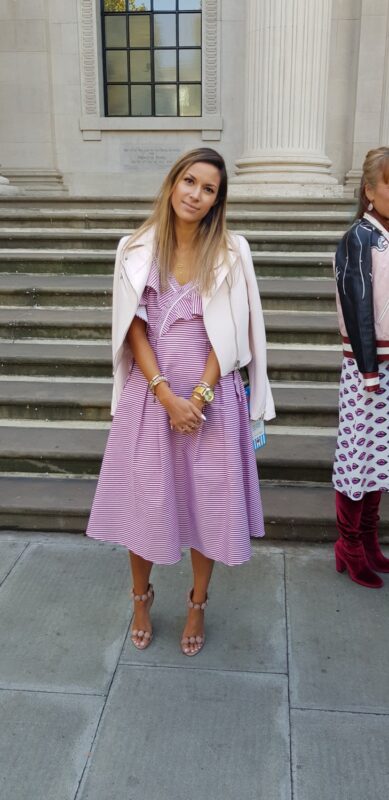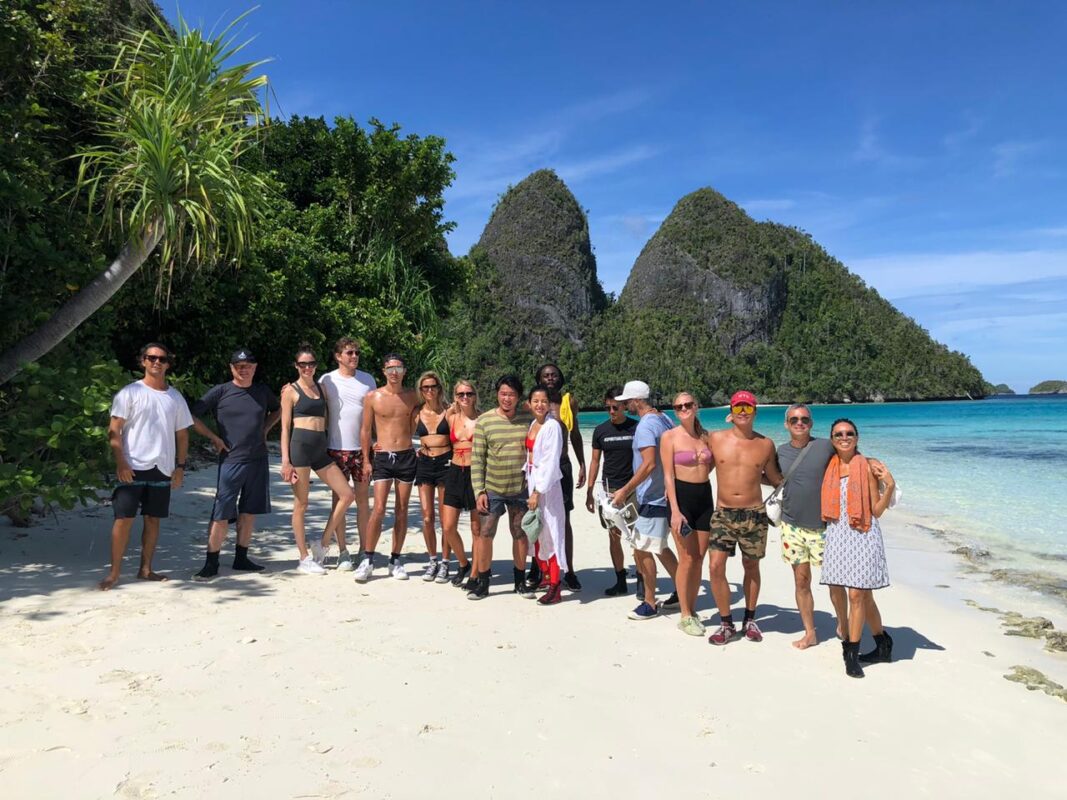Meet Francesca Armstrong, Chief Operating Officer of Connoco Group, which provides services to clients in over 30 countries across 5 continents. Connoco is one of Europe's fastest-growing entertainment brands. She and her partner started their first business at age 21 and now they have several businesses. She started training programs across Bangladesh and other developing countries empowering young people and women, bringing them out of poverty.
Who is Francesca Armstrong? Define yourself.
I am the Chief operating officer and Co-Founder of various businesses that I started over the years with my partner Tim. Having started our first business from our front room at 21, our portfolio of investments and companies now operates in most continents across the globe.
Across the past decade, I have built out and headed up teams across Europe, the USA and Asia. I would say I’m no stranger to the challenges and adversity that comes with start-ups and building businesses in developing markets. From Events and E-Commerce to Property and Manufacturing, I have a diverse range of experience. Within work, I’m passionate about finding solutions to problems and working with people.
How were you as a kid?
I describe myself as the ugly duckling because I grew into myself in many ways.
As a child, I was never the ‘popular’ kid nor the ‘pretty’ kid. Where I grew up was a wonderful part of the UK, but it wasn’t the most diverse of places. Going to school, my sisters and I were three of a handful of other kids that were ethnically different. I was always aware being mixed Chinese-English that I was different to most people around me, and I think that contributed to my awkwardness. Today kids are so much more clued in and aware of diversity, and it is embraced a lot more.
“For me, success is a series of steppingstones to achieve goals”
You studied fashion at Kingston University and University of the Arts London (Central St Martins) and are studying Justice and leadership at Harvard Business School, why did you choose those courses of study?
Studying fashion was a natural decision for me; I was always passionate about design, fashion, style, and the arts. For as long as I can remember, I always wanted to have my own label, and I have always designed and made a lot of what I wear. It is still something I plan to expand our portfolio into in the future. The story behind studying Justice at Harvard is an interesting one. Around three years ago, one of our businesses, myself and partner were falsely accused of committing regulatory offenses within the ticketing and events sector.
I am pleased to say that after three long years battling back and forth with the government department that accused us, all charges were dropped, and we were fully acquitted. It was a very long and exhausting journey, and working very closely with our legal team, I ended up spending hundreds of hours studying and researching all aspects of criminal law to equip myself with the knowledge needed to fight our case.
You see these gut-wrenching Netflix documentaries focusing on the falsely accused and what it’s like to get stuck in the system. Well, for three years, that was me. Where prior I was always led to believe that we live in a society where you are innocent until proven guilty. It intrigued me how unjust the reality really is, and that is where my intrigue led me to start studying Justice and its true meaning.
You are a former international model; how did you jump from that point to become a Chief Operating Officer of Connoco Group and an entrepreneur at the age of 21?
I was signed to the UK’s leading agency Models1, having been scouted as a teenager. It was an amazing adventure that exposed me to so many great experiences both in the UK and overseas. However, modelling was never something I had planned to do, and my focus was always on studying and the path I had planned out for myself with university. I ended up giving it up when I started University, as it became too much to juggle with everything I was doing.
Whilst at University, my partner Tim and I started our first business, which grew from strength to strength and although I went into university with my plan to go into fashion design, by the time I graduated, our business was already demanding so much of my time, and our revenue was doubling month on month that it was a natural move to commit myself to that full time.
Fast forward 12 years, and here we are today.
“Learning is the most valuable currency in the world, and we should never be too proud or too knowledgeable to learn new things”.
With Connoco Group, you have developed the business which operates in over 5 countries across the globe, 100% and you are the co-founder of Armcon industries, an investment house with interests in F&B, Fitness, Entertainment, Agriculture and Property across Southeast Asia. What’s the recipe for your success?
For me, success is a series of steppingstones to achieve goals. However, as an overachiever, by the time I have accomplished these, I have usually moved the goalposts higher and further away! I believe we should never stop learning. I still see myself at the beginning of the journey to where I want to go. Learning is the most valuable currency in the world, and we should never be too proud or too knowledgeable to learn new things.
“In a time of drastic change, it is the learners who inherit the future. The learned usually find themselves equipped to live in a world that no longer exists.” – Eric Hoffer.
Foundation is also vital. Everything we do has to be based on solid foundations, or eventually, it will fall. For our businesses, this involves having a solid team, tried and tested processes and evolving training in place to ensure our foundations remain aligned with what we are building. Planning, structure and staying focussed on what you’re trying to achieve are also essential factors. If you do not know what you are trying to achieve, you’re not going to get there.
You have started training programs across Bangladesh and other developing countries empowering young people and women, bringing them out of poverty through education, tell us more about this project and what does it drive you?
Through the process of expanding our businesses into developing markets, the differences between the lives and opportunities of our teams on either side of the world became starker and starker. It opened my eyes early that the biggest stumbling block to so many people is access, and this became something that I became passionate about. Whether that’s access to education, equipment or even transportation, that opens the doors to being able to earn and work. One thing that is clear is the fastest way out of poverty for any family is work.
I look at our teams in Bangladesh and the barriers to entry so many of my female colleagues have already gone through before they even sit down to be interviewed. From breaking through the social stigmas and financial limitations to get a higher education to the social and safety setbacks of not being able to go out alone. Having grown up in the UK, with the privileges and access to so many tools that have given me a head start in life, I am, of course, aware that I cannot necessarily influence other people’s businesses and the lives of their teams. Still, I made it my mission to champion a better life for the people and their families that work with us.
In our businesses, we saw the positive impact creating training programmes that would upskill our teams in areas outside of their role had on their abilities at work and their contribution to the company. Alongside this, we work with our teams to provide loan equipment that they can take home so their children and families can also have access to the internet and a laptop which provides a foundation for learning and connection to the world outside their community which many of us take for granted. In our business, I am also passionate about championing women into management and leadership roles, not only through further training but by instilling the confidence they so often needed to put themselves forward alongside men for a role they are more than capable of but don’t believe they are.
“Treat everyone with compassion. This can be hard in a business environment, as sometimes you must be ‘bad cop’, but as long as the integrity behind your actions and decisions takes into account compassion for who you are dealing with, you can never regret your choices”
Do you have a book, podcast, or talk that’s had a deep impact on your thinking?
Brene Brown – The Power of Vulnerability. That book taught me The importance of being vulnerable and learning what that means for you individually. It also made me realise that there is no such thing as ‘perfect. I had spent much of my adult life striving for perfection in everything I did. Brene taught me, ‘It’s unattainable and based on a perception of how you believe others see you.’
Do you have any philosophy that guides your career decisions?
I wouldn’t say I have a particular philosophy, but there are definitely …mindset/rules that I stick by (follow) including:
- You only have yourself to blame
- Never stop learning – mistakes can be our best experiences
Also, to treat everyone with compassion. This can be hard in a business environment, as sometimes you must be ‘bad cop’, but as long as the integrity behind your actions and decisions takes into
You love fashion, and there is a stereotype that says smart women don’t care about their appearance, that fashion is superficial, you are a brilliant woman, and you are pretty and have a sense of style, what would you say those people that have this wrong idea?
Thank you, that’s very kind of you to say. I would say that generally, other people’s judgement of you often has nothing to do with you, but more so their own insecurities, limitations and needs. Our image and what we choose to portray or represent is an entirely personal choice. We all have to make that choice based on what we are comfortable with.
I meet many ‘serious’ people who view fashion as superficial, as you mention, those people are often of the opinion that it's superficial to be so interested in what I wear or how I dress. To me, it is as much of a choice not to have an interest in your appearance as it is to have one.
Ultimately, it’s all part of our armor as human beings. For me, fashion is a big part of what drives me, makes me feel confident and when I feel my best, I feel ready to take on anything.
For others blending in with the crowd Is part of their armour. It’s all individual to each of us.
Working in various cultures around the world, I am constantly evolving and adapting my style for what works for me to feel comfortable with where I am in my life at that time. For me, this is all part of feeling empowered, safe and respectable.
It took me a long time to work out the ‘rules’ about dressing for work until I realised there aren’t any. It’s up to you. What works for you and what you want to portray. I spent a long time putting on an ‘Armor’ that wasn’t me because I thought I would be more ‘respected’ or taken more seriously. Finally, I concluded that being myself is what makes me ME and not whatever lens other people view me through. People will always judge you, whether you try or don’t, so make sure you dress for yourself. In business, fashion is no more superficial than the grand offices, flashy business cards or anything else we invest into ‘represent’ our brand. A table in a garage or a scrap of paper would equally serve the same ‘practical’ purpose.
“For me, fashion is a big part of what drives me, makes me feel confident and when I feel my best, I feel ready to take on anything”
What does a normal workday look like for you?
A typical workday for me starts around 7.00; my first task of the day is to scan through emails and messages that have come in through the night to check if anything needs an urgent response. After a quick coffee, I will head to a gym class. Generally, I will work in the car there and back and on the way check-in with our teams. If I’m travelling, I will look for a gym with classes or use the hotel one. I also do a daily ice bath of 6 degrees Celsius for 6 minutes, which focuses the mind and forces me out of my comfort zone. I have been doing this since the beginning of the year now and really feel the benefits for both the body and mind of seeking discomfort and pushing your abilities to handle stress.
In my work life, it’s easy to get caught up by stress and doing this trains the mind to handle stress with greater ease. The gym is my bit of me-time where I clear my head, ready for the day. Having a routine is very important for me, as it helps me keep on top of everything and allow me to make the best use of my time. The rest of the day varies depending on where I am in the world, but usually consists of calls with our teams, meetings with clients and a lot of laptop time! Over the past two years, I have tried to build more balance into my life, so I aim to fit in a couple of dinners or lunches a week with friends.
What do you love most about your job? & What is the most difficult part?
What I love are all the new experiences. Every day brings something different. The most difficult part is that ‘something different’ is very often a challenge to overcome. Also, despite being surrounded by people all the time, it can be pretty lonely. You can never get too close or too attached to anyone you work with. Ultimately the buck always stops with you, so you always end up having to have some barriers up.
What is one strategy that has helped you to grow your business?
Hire people that have the skills you don’t. Also diversifying. This is the bittersweet part of building out and growing our businesses. At times it can feel overwhelming, with so many different ‘hats’ to wear depending on which perspective or sector I’m working on.
However, diversifying young has been the thing that saved us when one business isn’t doing quite as well. We got into property early, which has been the fruit that keeps yielding.
During Covid, having a diversified portfolio of investments and businesses spread across not just multiple sectors but also multiple markets has enabled us to maintain growth even when it has felt like we have been at a standstill.
“Hire people that have the skills you don’t. Also diversifying. This is the bittersweet part of building out and growing our businesses”
Based on your experience as an investor, in a traditionally male space, working predominantly in Asia, how do you see the investment landscape post- COVID-19?
I see a lot more focus on managing risk and diversifying. For us as a company, risk profiling when investing or even thinking about investing has changed considerably. Having seen and experienced the fallout through the pandemic, calculations for any new investment now must factor in many additional safeguards. Including building in the potential for blackout/downtime within our calculations and the ability to expand and contract infrastructure, as we have seen with offices closing for extended periods.
Re-thinking and considering our contract terms, especially when it comes to leasing buildings and also the resilience and agility of the business to adapt. We are now asking the question – are we able to flip the business model overnight to reinvent itself and still provide a service if needed. A great example of this has been in the Food and Beverage sector, where we have seen restaurants forced to close reinventing their business model to ‘dine at home. Another critical consideration for us is the online presence and offering of the business/investment. Are we still able to reach and interact with our consumer or target market even when people physically can’t go anywhere? As part of all of this, we are constantly reminding ourselves that consumers often forget what happened yesterday; therefore, shifting the habits of our consumers if required should always be possible.
What are the do and don’ts in business for women?
- Embrace all the parts of your character and personality that make you the woman you are. Although society often portrays many female traits, such as being more ‘sensitive’ or in ‘touch with emotions’ as weaknesses, use these to your strength. These are all part of your judgment.
- Don’t give up your seat at the table because you feel inferior or less worthy. There is a great book called ‘Lean In’ by Sheryl Sandberg that delves into why so many women allow themselves to be left out of the ring by never entering it in the first place.
Everybody has had dark moments in their lives, what have you done to get out of that phase?
Believe that you CAN get out of whatever is holding you back or down. I learnt it’s never too late to change your circumstances. Just never give up. The only person you can ever let down is yourself. Don’t worry about others’ perceptions or worry about letting them down. In not letting yourself down, your integrity will mean you won’t let anyone else down.
Focus on what you’re trying to achieve and if everything seems overwhelming, celebrate taking one small step at a time. Before you know it, you will be where you were trying to get in the first place.
“ It’s never too late to change your circumstances. Just never give up. The only person you can ever let down is yourself”
What do you like to do in your spare time?
I’m really passionate about great food. When I can, I love to cook and explore new food. Travelling so much (pre-covid) I would always research and hunt out exciting places to eat in each city I would go and in between my work schedule always try and make time to try the local food of wherever I am, making sure to search out the best-hidden spots.
I also enjoy taking care of my health and wellbeing. Having spent many years close to the point of burnout, I now try to make time to look after my mind and body.Whether this is going to the gym and fitting in daily workout classes or experimenting with cold therapy, meditation or breathwork. I am continually looking to improve myself and explore new things.
Many authors say women can and must strive to have everything – a shining career, a blossoming family life and a perfectly balanced lifestyle all at once, others point out that– then women are placing unrealistic expectations on themselves if they believe they can have it all, so according to your experience, what do you think about these statements?
I am not married nor have any kids yet, but society definitely does put pressure on women to have and do everything, including both of those things. I also feel, however, that we put a lot of that pressure on ourselves. We are often overachievers, and as women, I think we strive that bit further to achieve. This partly comes from a place of having to prove ourselves more than our male counterparts do, but also from the added pressures we put on ourselves to ‘do it all.
I am a firm believer that we can have it all if we want. But the question we should be asking ourselves is whether we want it all? For centuries society carved out a message of what women should do. However, with evolution, we have carved out a new message for ourselves, and this has translated into a somewhat toxic idea that we have to do it all! We set ourselves this impossible task of juggling, not just doing it all, but being the best at it all.
Whether this is in our work or in our personal lives. We want to be as financially successful as men while also being that grounded, permanently available figure of stability at home. I believe part of this ideology comes from a lack of references to draw from. So, we draw from each other and, with that create a vicious cycle of comparison. For men, this doesn’t seem to be much of an issue. Much of history has been written by men. While women have historically been seen as ‘women’ and not as whatever role they were taking.
We all know women in highly successful positions that too often allow themselves to take a back seat when it comes to being credited. There is an excellent quote by Clare Boothe Luce, (who was the first American woman to become an ambassador posted abroad.)
She says, “Because I am a woman, I must make unusual efforts to succeed. If I fail, no one will say; “She didn’t have what it takes” They will say; “women don’t have what it takes”.
We carry the responsibility of paving the way for the daughters that come behind us.
The other part of that ‘I can do it all’ mentality is not saying No. We say yes to everything, take it on and then pay the price ourselves.
So really, I see that it comes down to our choice to decide what we want and how much are we prepared to do to get it. Ultimately, we must find our own balance and prioritise what is most important to us.
What are your plans for the future?
I plan to continue to grow our businesses. We are currently investing in some exciting new projects and entering some new markets which I’m sure will bring many new experiences! Hopefully, I can begin to travel more again and get back to seeing our teams around the world more regularly.
There is still the glass ceiling for women in the world: Fewer opportunities, jobs underpaid just for that fact of being a woman, etc. Have you experimented with the glass ceiling? If yes, what are the biggest challenges you have faced and how have you overcome them?
I agree there are still so many challenges and barriers to entry for women globally, especially in the world of work and business. Having spent so much time in developing countries, I am acutely aware that no matter the challenges I face as a woman in the western world, the difference in opportunities for men and women in developing markets is starkly different, and in that I am very fortunate. Being a female leader, I have definitely had to push a lot of ‘society led’ boundaries of what is ‘expected in these markets.
I am, however, a firm believer that we lead by example and re-focussing peoples mind, opinions and pre-conceived ideas of what ‘should be is how we make a change.
It takes all of us to do our little bit. Even if we change the perception for one person, we break through that ceiling a little bit more. The more we propel ourselves into bigger and better opportunities, the more references the girls and women that come after us have to draw from.
“The more we propel ourselves into bigger and better opportunities, the more references the girls and women that come after us have to draw from”
What tips, can you give to young girls who want to become an entrepreneur like you?
My top tip would be not to let someone else’s opinion stand in the way of doing what they wouldn’t. The choices, decisions and life of an entrepreneur are very different to the majority of people’s lives, so don’t expect to get the answers you´re looking for from the people around you. Believe you can, know what you want to achieve and believe in yourself enough not to give up.
I think in your position, many people may have the wrong idea of who you are, and what do you (professionally), with this idea in mind, what is being Francesca and what’s not?
Working as an Entrepreneur couple-duo with my partner over the years, the most common misconception is that I am just ‘The Girfriend’ or ‘The Wife’. It used to bother me that people would stereotype me as this, but over time I realised it can actually be an advantage to be underestimated. It means I’m rarely seen as a threat, which makes people open up a lot more.
The people that work with me and those that get to know me, know what I really do, and that’s all that matters at the end of the day.
It’s easy to get caught up worrying about what other people think of you, but when you let that all go, it’s a lot easier to focus on what you’re really doing. Me is…being efficient without being aggressive and leading by example. Me is not…relying on other people to create my future.
Who is the woman you admire the most and why?
There are many, but to name a few:
Victoria Beckham (Fashion Designer) – Along with being my fashion inspiration for many years, she has managed to grow an empire while reinventing herself repeatedly and still maintaining her own authenticity and identity.
Melanie Perkins (Co-Founder, Canva) – As one of the youngest female tech CEO’s and billionaires. She is proof that an idea from your bedroom can become a billion-dollar business with the right determination.
Sheryl Sandberg (Facebook CEO and authour of ‘Lean In’) – Aside from being one of my favourite books, ‘Lean In’ the movement started by Sandberg advocates for people of all genders to pursue their dreams without bias or other barriers holding them back. Her book Lean In has also been a great sounding board for me to believe in and push myself when I have doubts about my own abilities.
Name: Francesca Armstrong
Sector: Private Equity & Investments
Company: Armcon industries
Designation: Chief Operating Officer /Co-Founder & Group COO
Country: United Kingdom but now live predominantly in Asia.
Social media:
https://www.linkedin.com/in/francesca-armstrong/
https://www.armconindustries.com/

